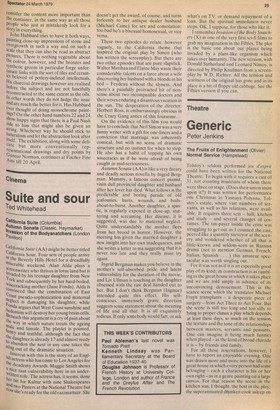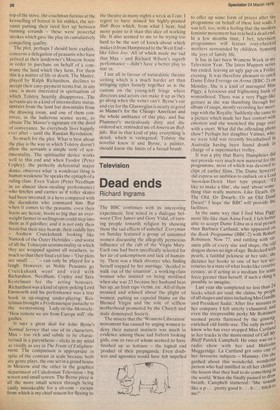Theatre
Generic
Peter Jenkins
The Fruits of Enlightenment (Olivier) Normal Service (Hampstead) Tolstoy's seldom performed jeu cr esprit could have been written for the National Theatre. To begin with it requires a cast of 31, not counting musicians of whom there were three on stage. (Does their union insist upon it?) It was written for performance one Christmas at Yasnaya Polyana, Tolstoy's estate, where vast numbers of servants, as well as his relations, were available. It requires three sets — hall, kitchen and study — and several changes of costumes. The tax-payer inside the critic was struggling to get out as I counted the cast, peered like a quantity surveyor at the scenery and wondered whether of all that is little-known and seldom-seen in Russian drama (not to mention German, French, Italian, Spanish . . . ) this amateur spectacular was worth singling out.
For it was not as if it is an especially good play of its kind; its construction is as rambling as the great house in which it takes place and we are told amply in advance of its unconvincing denouement. This is the seance scene which the translator Michael Frayn transplants — a desperate piece of surgery — from Act Three to Act Four. But the scene is still too long and too silly to bring to proper climax a play which depends, at least these days, so much on the tension, the texture and the tone of the relationships between masters, servants and peasants. One can imagine it being much funnier when played — as the kind of broad charade it is — by friends and family.
For all those reservations, however. I have to report an enjoyable evening. One was drawn more and more into the life of a great house in which every person had some belonging — each a character is his or her own right — as in a genre painting on a large canvas. For that reason the scene in the kitchen was,! thought, the best in the play; the superannuated daunken cook asleep on top of the stove, the coachman furious at the kennelling of borzoi in his stables, the servants putting their tired feet up between running errands — these were powerful strokes which gave the play its cumulatively compelling quality.
The plot, perhaps I should here explain, concerns a delegation of peasants who have arrived at their landowner's Moscow house in order to purchase on behalf of a commune the land which they farm. For them this is a matter of life or death. The Master, played by Ralph Richardson, declines to accept their easy-payment terms but, in any case, is more interested in spiritualism of which Tolstoy heartily disapproves. The servants are in a kind of intermediate status, upstairs from the land but downstairs from the drawing room, and one of them contrives, in the ludicrous seance scene, to obtain The Master's signature on the deed of conveyance. So everybody lives happily ever after — until the Russian Revolution.
So much for the plot. What is best about the play is the way in which Tolstoy doesn't allow the servants a simple note of sentimentality. The spiritualist device works well to this end and when Fyodor (Peter Copley). the perfectly deferential major domo, observes what 'a wondrous thing is human weakness' he speaks the epitaph of a ruling class. Even Yakov (Peter Needham in an almost show-stealing performance) who fetches and carries as if roller skates had been invented, is a hero compared with the decadents who command him. But when it comes to the peasants. even their boots are heroic, boots so big that an overweight farmer in wellingtons could step into them as if galoshes; and it is not only their boots but their nice beards, their cuddly furs — Andrew Cruickshank looking like Nanook of the Outer Hebrides — and worst of all the Tolstoyan sentimentality in which they are wrapped against all weathers, so much so that their final exit line — 'Our plots are small . . . ' — can only be played for a laugh. However, as Noble Peasants go Cruickshank went and vied with Richardson, Needham, Copley and Sara Kestelman for the acting honours. Richardson was a kind of spirit-poking Lord Emsworth and his performance was a text book in up-staging under-playing; Kestelman brought a Feydeauesque panache to the westernising Lady-in-the-Monocle: 'How remote we are from Europe still', she gushes.
It says a great deal for John Byrne's Normal Service that one of its characters, Max — too rich and subtle to be characterised in a parenthesis — sticks in my mind as vividly as any in The Fruits of Enlightenment. The comparison is appropriate in spite of the contrast in scale because both are genre plays, the one set in a grand house in Moscow and the other in the graphics department of Caledonian Television — big screen and small screen. The Byrne piece is all the more small screen through being easily mistakeable for a sit-corn — escape from which is my chief reason for fleeing to the theatre as many nights a week as I can. I regret to have missed his highly-praised Slab Boys which, from what I hear, had more point to it than this slice of working life. It also seemed to me to be trying too hard to be the sort of knock-about which makes it from Hampstead to the West End — like Gloo Joo. All of which made me sad that Max — and Richard Wilson's superb performance — didn't have a better play to star in.
I am all in favour of naturalistic theatre writing which is a much harder art than stringing epics loosely together as is the custom on the young-left fringe where directors and actors can make it up as they go along when the writer can't. Byrne's car and eye for the Glaswegian is nearly as good as Mamet's for the Chicago American and the whole ambiance of this play, and Sue Plummer's meticulously dirty and disordered set, reminded me of American Buffalo. But in that kind of play everything is detail, which is variegated; Tolstoy the novelist knew it and Byrne, a painter. should know the limits of a broad brush.



































 Previous page
Previous page